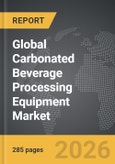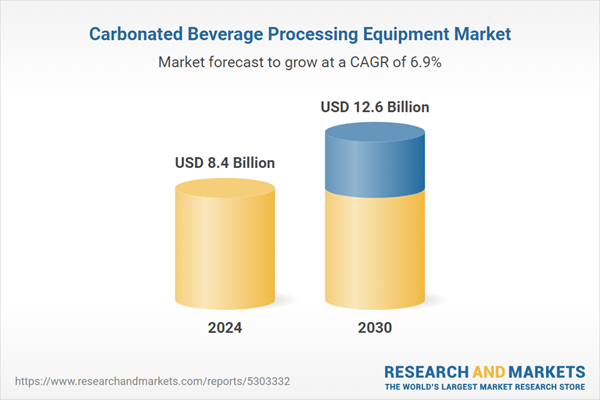Global Carbonated Beverage Processing Equipment Market - Key Trends & Drivers Summarized
Why Is Carbonated Beverage Processing Equipment Essential for the Beverage Industry?
Carbonated beverage processing equipment plays a critical role in the production of soft drinks, sparkling water, soda, and other fizzy beverages that are in high demand worldwide. This specialized equipment is responsible for various stages of the production process, including mixing, carbonation, bottling, and packaging, ensuring that beverages meet the required quality, taste, and safety standards. The increasing consumption of carbonated beverages, driven by lifestyle trends and consumer preferences for convenience drinks, has led to a growing demand for efficient and reliable beverage processing systems.The complexity of producing carbonated beverages, which requires precise control of CO2 levels, temperature, and pressure, has made advanced processing equipment indispensable for manufacturers. Beverage companies rely on this equipment to streamline production, reduce waste, and enhance productivity while maintaining the consistent taste and fizz that consumers expect. In addition, carbonated beverage processing equipment is designed to handle a wide variety of packaging formats, from bottles to cans, making it adaptable to different market demands.
How Are Technological Advancements Shaping the Carbonated Beverage Processing Equipment Market?
Technological innovations are significantly transforming the carbonated beverage processing equipment market, enhancing production efficiency, quality control, and operational flexibility. One of the major advancements is the development of automated systems that integrate various stages of beverage production, from ingredient mixing to carbonation and bottling. These automated systems reduce manual labor, minimize human error, and increase throughput, which is essential for high-volume beverage manufacturers. Automation also allows for real-time monitoring of critical parameters such as CO2 levels, temperature, and pressure, ensuring consistent quality across production batches.Additionally, innovations in energy-efficient equipment are gaining traction, particularly as manufacturers seek to reduce their carbon footprint and operating costs. New carbonation systems use advanced techniques to optimize CO2 usage, reducing waste and improving sustainability. The rise of Industry 4.0 and the Internet of Things (IoT) is also contributing to smarter manufacturing processes, with equipment now capable of predictive maintenance and data analytics. These technologies enable manufacturers to identify potential issues before they cause disruptions, reducing downtime and increasing overall production efficiency.
What Consumer Trends Are Driving Demand for Carbonated Beverage Processing Equipment?
Consumer preferences are a major factor driving the demand for carbonated beverage processing equipment. The increasing popularity of ready-to-drink (RTD) beverages, flavored carbonated waters, and health-conscious alternatives such as low-sugar sodas is influencing manufacturers to expand their product portfolios. In response, beverage companies are investing in versatile processing equipment that can handle a range of formulations, flavors, and packaging formats to meet the changing tastes of consumers. This has led to a surge in demand for modular and scalable equipment that allows manufacturers to quickly adapt to market trends without significant overhauls in production infrastructure.Another trend impacting the market is the growing consumer interest in sustainability and eco-friendly products. Consumers are increasingly looking for beverages that are produced using sustainable practices and packaged in environmentally friendly materials, such as recyclable or biodegradable containers. As a result, manufacturers are seeking out processing equipment that supports the use of eco-friendly packaging and energy-efficient production methods. This shift is driving demand for equipment that not only enhances production efficiency but also aligns with the sustainability goals of both manufacturers and consumers.
The Growth in the Carbonated Beverage Processing Equipment Market Is Driven by Several Factors
The growth in the carbonated beverage processing equipment market is driven by several factors, including rising consumer demand for carbonated drinks, advancements in production technology, and the increasing focus on sustainability. One of the primary drivers is the continued growth in the global consumption of carbonated beverages, particularly in emerging markets where urbanization and rising disposable incomes are boosting the demand for soft drinks and sparkling water. This demand is encouraging beverage manufacturers to invest in state-of-the-art processing equipment that can handle high production volumes while maintaining product quality.Technological advancements are another key driver, as manufacturers seek out automation, energy-efficient solutions, and IoT-enabled equipment to streamline operations and reduce costs. Automated systems, in particular, are becoming essential for beverage producers looking to enhance efficiency and consistency in their production processes. The trend toward sustainable production practices is also influencing equipment investments, as manufacturers look for ways to reduce CO2 emissions and energy usage. Additionally, the need for flexible equipment that can adapt to changing consumer preferences - such as the rise of health-conscious carbonated beverages - is further driving growth in the market. These factors, combined with increasing global competition and the need for innovation in the beverage industry, are expected to continue driving the expansion of the carbonated beverage processing equipment market in the coming years.
Report Scope
The report analyzes the Carbonated Beverage Processing Equipment market, presented in terms of market value (US$ Thousand). The analysis covers the key segments and geographic regions outlined below.- Segments: Equipment Type (Sugar Dissolvers, Carbonation Equipment, Blenders & Mixers, Heat Exchangers, Other Equipment Types); Beverage Type (Flavored Drinks, Functional Drinks, Club Soda & Sparkling Water).
- Geographic Regions/Countries:World; United States; Canada; Japan; China; Europe (France; Germany; Italy; United Kingdom; Spain; Russia; and Rest of Europe); Asia-Pacific (Australia; India; South Korea; and Rest of Asia-Pacific); Latin America (Argentina; Brazil; Mexico; and Rest of Latin America); Middle East (Iran; Israel; Saudi Arabia; United Arab Emirates; and Rest of Middle East); and Africa.
Key Insights:
- Market Growth: Understand the significant growth trajectory of the Sugar Dissolvers segment, which is expected to reach US$4.4 Billion by 2030 with a CAGR of a 7.6%. The Carbonation Equipment segment is also set to grow at 6.6% CAGR over the analysis period.
Why You Should Buy This Report:
- Detailed Market Analysis: Access a thorough analysis of the Global Carbonated Beverage Processing Equipment Market, covering all major geographic regions and market segments.
- Competitive Insights: Get an overview of the competitive landscape, including the market presence of major players across different geographies.
- Future Trends and Drivers: Understand the key trends and drivers shaping the future of the Global Carbonated Beverage Processing Equipment Market.
- Actionable Insights: Benefit from actionable insights that can help you identify new revenue opportunities and make strategic business decisions.
Key Questions Answered:
- How is the Global Carbonated Beverage Processing Equipment Market expected to evolve by 2030?
- What are the main drivers and restraints affecting the market?
- Which market segments will grow the most over the forecast period?
- How will market shares for different regions and segments change by 2030?
- Who are the leading players in the market, and what are their prospects?
Report Features:
- Comprehensive Market Data: Independent analysis of annual sales and market forecasts in US$ Million from 2024 to 2030.
- In-Depth Regional Analysis: Detailed insights into key markets, including the U.S., China, Japan, Canada, Europe, Asia-Pacific, Latin America, Middle East, and Africa.
- Company Profiles: Coverage of players such as Alfa Laval, Bevcorp Beverages Equipment, Bucher Industries, Carmel Engineering Inc., Central States Industrial and more.
- Complimentary Updates: Receive free report updates for one year to keep you informed of the latest market developments.
Some of the 42 companies featured in this Carbonated Beverage Processing Equipment market report include:
- Alfa Laval
- Bevcorp Beverages Equipment
- Bucher Industries
- Carmel Engineering Inc.
- Central States Industrial
- Dematech
- FH Scandinox A/S
- GEA Group
- JBT Corporation
- KHS GmbH
- Krones Group
- Lee Industries
- Mojonnier
- Pentair
- Praj Industries
- Shanghai Joylong Industry Co.
- SPX Flow
- Techniblend Inc.
- Tetra Laval
This edition integrates the latest global trade and economic shifts into comprehensive market analysis. Key updates include:
- Tariff and Trade Impact: Insights into global tariff negotiations across 180+ countries, with analysis of supply chain turbulence, sourcing disruptions, and geographic realignment. Special focus on 2025 as a pivotal year for trade tensions, including updated perspectives on the Trump-era tariffs.
- Adjusted Forecasts and Analytics: Revised global and regional market forecasts through 2030, incorporating tariff effects, economic uncertainty, and structural changes in globalization. Includes historical analysis from 2015 to 2023.
- Strategic Market Dynamics: Evaluation of revised market prospects, regional outlooks, and key economic indicators such as population and urbanization trends.
- Innovation & Technology Trends: Latest developments in product and process innovation, emerging technologies, and key industry drivers shaping the competitive landscape.
- Competitive Intelligence: Updated global market share estimates for 2025, competitive positioning of major players (Strong/Active/Niche/Trivial), and refined focus on leading global brands and core players.
- Expert Insight & Commentary: Strategic analysis from economists, trade experts, and domain specialists to contextualize market shifts and identify emerging opportunities.
Table of Contents
Companies Mentioned (Partial List)
A selection of companies mentioned in this report includes, but is not limited to:
- Alfa Laval
- Bevcorp Beverages Equipment
- Bucher Industries
- Carmel Engineering Inc.
- Central States Industrial
- Dematech
- FH Scandinox A/S
- GEA Group
- JBT Corporation
- KHS GmbH
- Krones Group
- Lee Industries
- Mojonnier
- Pentair
- Praj Industries
- Shanghai Joylong Industry Co.
- SPX Flow
- Techniblend Inc.
- Tetra Laval
Table Information
| Report Attribute | Details |
|---|---|
| No. of Pages | 285 |
| Published | January 2026 |
| Forecast Period | 2024 - 2030 |
| Estimated Market Value ( USD | $ 8.4 Billion |
| Forecasted Market Value ( USD | $ 12.6 Billion |
| Compound Annual Growth Rate | 6.9% |
| Regions Covered | Global |









